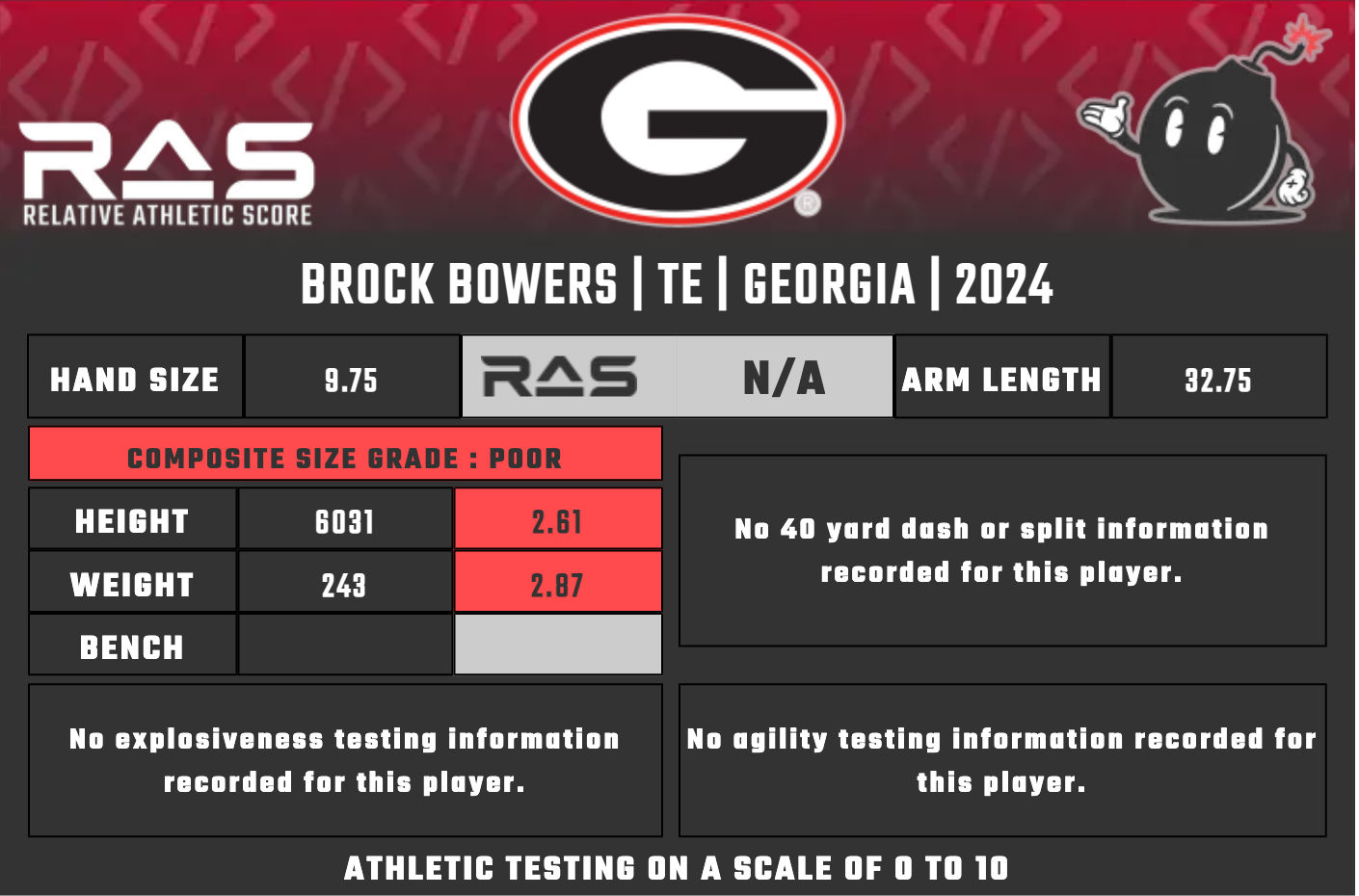
Brock Bowers, YAC King—Rookie TEs Tiers 1-3
Tier 1 - YAC King
Brock Bowers
At a Glance
Brock Bowers is smaller than you'd expect from a high-end TE prospect and we don't know for sure how athletic he is. But that doesn't change the fact that he's one of the best TE prospects of all time.
Positive Indicators
In his first season at Georgia, Brock Bowers posted a 56/882/13 receiving line, good for a 24% yardage share and 29% dominator rating.
I mentioned this season several times in my WR profiles. This was the year that AD Mitchell (freshman), Ladd McConkey (redshirt freshman), and Jermaine Burton (sophomore) all played together. It's confusing to see such poor production from all three talented WRs, with Burton leading the pack with a 16% dominator rating—until you realize that Brock Bowers stepped in and made this his passing offense... as a true freshman tight end.
Bowers followed up with a 53/942/7 receiving line for a 21% yardage share and 22% dominator rating in 2022 and a 56/714/6 receiving line for a 22% yardage share and 26% dominator rating in 2023.
Bowers never had a breakout season by the 30% dominator rating threshold, but his career 26% dominator rating is very impressive for a tight end.
And Bowers was ridiculously efficient at Georgia. He turned in a 3.01 YPRR in his very first season, with a 2.37 YPRR in 2022 and a 2.65 YRR in 2023. The only three-year WRs in this class with a higher career YPRR than Bowers (2.65) are Marvin Harrison Jr. (2.98) and Malik Nabers (2.83).
Bowers was also impressive as a run blocker at Georgia, with a career PFF grade of 75. That's not quite at George Kittle's (82) level, but it's the same mark as borderline tackle Darnell Washington—Bowers is a competent blocker.
And all we really need here is competency. The worry is that poor run blocking will lead to reduced play action snaps. That's been an issue for Kyle Pitts, for example, who had just a 44 career run blocking grade at Florida.
Bowers is an undersized TE and isn't overpowering in the run game, but he's sound.
Bowers is also truly elite after the catch. As a true freshman, he led all FBS TEs with 522 YAC. Trey McBride (456) finished second, and Isaiah Likely (406) finished third.
Bowers then led the FBS for a second year in a row with 479 YAC. Dalton Kincaid (397) finished second, and Sam LaPorta (368) finished third. Bowers was a true sophomore, while LaPorta was a true senior and Kincaid a fifth-year senior.
We're not done.
...
He did it again.
HE DID IT AGAIN.
In 2023, Bowers once again led all TEs in the nation with 486 YAC.
And by the way... I'm underselling this.
In all three of his college seasons, Bowers not only led the FBS in YAC, he also led the FCS. 297 teams—yet Bowers held the tight end YAC belt from his true freshman season until the day he declared for the draft.
At tight end, we need a path to players being more than just glorified run blockers. Every team needs a tight end. Every playbook has tight end routes. But few teams actually need to consider the TE when putting a game plan together. Bowers doesn't just look like a receiver who plays tight end. He looks like a difference-making receiver. Like a high-end WR prospect, if Bowers hits, he is likely to shift the gravity of his offense, pulling targets in his direction.
Bowers was also incredible at delivering YAC on downfield targets. On 10+ yard targets, Bowers averaged 5.9 YAC per target and 14.5 YAC per game. Both are the highest marks by a TE in my database. If we expand to WRs, only Jameson Williams finished higher in YAC per downfield target. Corey Davis, CeeDee Lamb, Jameson Williams, Rashod Bateman, and Justin Jefferson were the only Round 1 WRs with more downfield YAC per game.
As you would expect, Bowers' coaches also looked to get him the ball on schemed targets, boosting his production. But it's hard to be concerned when Bowers was such a dominant force in the intermediate area.

Red Flags
As you can see above, Bowers did not show great separation ability on deep targets, with a 50% contested target rate. As a deep threat, he's likely to need to win with physicality. Fortunately, he was good at that, with a 54% contested catch rate on deep targets. But it's still important to realize Bowers has some potential passing game limitations. He looks like an elite intermediate playmaker but will be best in an offense with a true field stretcher who can help open up the middle.
Bowers is also small for a tight end, weighing in at just 6-foot-3, 243 at the Combine. He isn't going to be an overpowering physical force in the NFL and, as Nate Tice recently pointed out, Bowers won't excel as a traditional inline blocker in the NFL.
"As a blocker, Bowers is willing to scrap against larger bodies, and actually does an adequate job at the point of attack against edge defenders. He has good initial technique and strike, but will lose late because of a lack of overwhelming length and size that will only get harder against NFL defenders. Blocking in-line will not, and should not, be a large part of Bowers’ game at the next level, but it is one aspect where he is not an outright positive contributor. He’s not a bad blocker, in fact he’s a solid one, it’s just that he has natural size limitations to be an overwhelming player in that area."
Nate Tice also noted that defensive coordinators are likely to frequently match Bowers with a cornerback rather than letting him dice up linebackers. As Nate points out, this actually raises his ceiling.
"Winning against defensive backs will open up a Cheesecake Factory-like menu of options for a play-caller on how to use Bowers and also causes even more headaches for defensive coordinators."
But even for a TE with Bowers' college profile, beating NFL cornerbacks is still a difficult challenge. If defensive coordinators treat Bowers as a big WR... then he'll have to win like a WR, which is a high bar for any tight end.
This high bar serves as a reminder that we are taking a small leap of faith with Bowers' athleticism. Recovering from a hamstring injury, Bowers opted not to participate in timed drills at his Pro Day.

Athleticism has historically been very important at the tight end position, but so have production and efficiency. Bowers has production and efficiency in spades, demonstrating high-end football skill. He still needs to be sufficiently athletic, but I wouldn't be worried about his outlook unless he had tested legitimately poorly.
Given that Bowers didn't test in the context of recovering from a hamstring with locked-in Round 1, likely top 20, draft capital, I'm also not especially convinced this means anything.
Take however worried you were that Marvin Harrison didn't work out and multiply it by 1.5 (testing is TE premium, people forget).
Statistical Comps
- Eric Ebron
- Michael Mayer
- Aaron Hernandez
- Evan Engram
Best Ball / Dynasty Outlook
Bowers doesn't have to be a wide receiver playing tight end. In the hands of a capable NFL coach, he projects to produce like a wide receiver while still playing tight end. What's the difference? Playing time.
Pure pass set – Bowers is on the field. Power run play – Bowers is on the field. Goal line play action – Bowers is on the field.
Bowers was a capable run blocker in the SEC... he's going to be fine blocking nickel corners. And Bowers' ability to dictate defensive personnel seems like a powerful tactical weapon in the hands of a coach like Shane Steichen.
Imagine defending an Anthony Richardson/Jonathan Taylor rushing attack by matching 11 personnel with dime coverage. Alternatively, imagine run fakes that leave Bowers one-on-one against a linebacker. Bowers might not be an immediate mismatch against every NFL defender, but a sharp coach can still use him to keep defenses on their heels, generating plenty of production for the rookie in the process.
Additionally, to the extent that Bowers is a big WR, he's a big slot WR.
Bowers played 52% of his snaps in the slot, 10% outside, and 37% inline. For comparison, Kyle Pitts played 25% in the slot, 23% outside, and 52% inline at Florida. Bowers is more in the Zach Ertz mold than he is like Kyle Pitts. As a Giant X WR, Pitts was a less conventional TE prospect than Bowers.
Sure, you'll detach Bowers from the line more than an inline staple like Dalton Schultz. But you can look around the league and see players like Mark Andrews, Sam LaPorta, Dalton Kincaid, Evan Engram, and Trey McBride, who play a ton of snaps in the slot. Put Bowers in a role like any of those players, and he's going to be effective... and productive.
Not every coach is sharp enough to figure this out. If your favorite movie is Goldmember, you might not be the right fit for Brock Bowers.
But Bowers doesn't need someone to unlock him. He needs someone not to screw it up.
I have 16% of Bowers in the Big Board, and after writing him up, I broke into a cold sweat. I don't have enough Brock Bowers.
In dynasty, I know we all feel burned by Kyle Pitts. And we just got rewarded for much cheaper selections of Sam LaPorta, Dalton Kincaid, or Trey McBride. But Bowers is the level of prospect who shouldn't make it past the top half of rookie drafts. He's too good.
And yet... Bowers will fall past that range because of how strong the top half of rookie drafts are this year. The fact of the matter is that at 1.07 you're going to have access to a caliber of prospect you really don't have any right to that late. If JJ McCarthy goes to the Vikings, and you can get Bowers at 1.08... that's almost unfair.
Best Ball Recommendation
Priority target.
Superflex Rookie Draft Grade
Early 1st round.


